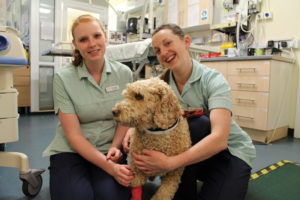Thankfully many clients at Brentknoll understand the importance of pet insurance, however there's always pet owners who leave it too late and feel the pinch when the unexpected happens.
Pet insurance companies love to use terms that can make it seem like a minefield, their policies are filled with enough jargon to put anyone off reading the small print (often how people get caught out). If your pet becomes sick or gets injured, the last thing on your mind should be money, so lets help you choose the right policy for you and your pet.
Firstly, why bother with pet insurance?
The NHS means that if us humans get ill, we can walk into the doctors and receive free medical care until the problem is fixed. Unfortunately, there is no NHS for pets and so medical treatment for your pet will need to be paid for by you as their owner. The cost of pet healthcare can range from £10 to £10,000 depending on the treatment provided; thanks to medical advances, the services available for pets is almost as advanced as those available to humans (but this doesn't always come cheap.) Having insurance, allows you to benefit from this wonderful range of services without fear of how to pay the vets bills.
What type of insurance do I need?

This will depend on your needs and how much cover you would like. Policies can range greatly in what they cover and so to will the price. We'd always recommend going for the highest level of cover you can afford, it's better to have too much cover and never need it than to not have enough when the time comes. With this is mind, a mid-level lifetime policy is usually preferable over basic 12 month or time limited policies.
Life time cover
Whilst we recommend getting lifetime cover for your pet, this term is sometimes stretched by insurance companies when selling insurance policies. A true lifetime policy, will mean your pet is covered for their whole life with ongoing cover year after year.
Lifetime (but with an age limit)
Some companies call their policies lifetime but state in the small print that cover runs out when the pet reaches a certain age, at this point (usually when you really need it), you will not be covered and will be left to pay vets bills yourself.
Lifetime (but with a financial limit)
Other policies are called lifetime and they will renew year after year, however, they may have a financial cap.
For example your policy may pay up to £7000 per condition, but this 'pot of money' is to cover the pet's whole life. This is a problem if your pet uses up their £7000 in the first 3 years and goes on to live for another 10 years after that, as there is no money left in 'in the pot'.
An example of a True Lifetime policy
Petplan covered for life plans offer true lifetime cover. Your 'pot of money' will re-fill year after year and won't stop when the pet reaches a certain age. As with most insurance companies, an additional financial contribution will be added when your pet gets older, for example, you will pay a fixed policy excess of £75.00 plus 10% of vet treatment, which is a lot better than cover stopping completely or money running out.
When to get Insurance?
If you take out an insurance policy after your pet has been ill, you will not be covered for that condition. Any medical problem noted before your policy start date is called a 'pre-existing condition'.

So, the best time to take out insurance cover is before any problems have arisen. By getting your pet insured when they are young and healthy, you avoid pre-existing conditions being excluded from cover. If an exclusion is placed on your policy, the insurance company will not pay for that medical condition.
Sometimes exclusions may be temporary. For example;
Your new puppy gets diarrhoea within a day or two of bringing them home, you take them to the vets who recommend you get them insured, so you go home and like a responsible owner take out insurance. The insurance company will ask you about his/her health and you will have to declare the diarrhoea. They will probably place an exclusion on your policy for gastro-related problems, because the puppy has had an upset tummy before you took the policy out. With many insurance companies this exclusion will be lifted providing your puppy doesn't have any further tummy upsets within a designated time frame i.e. 12 months.








